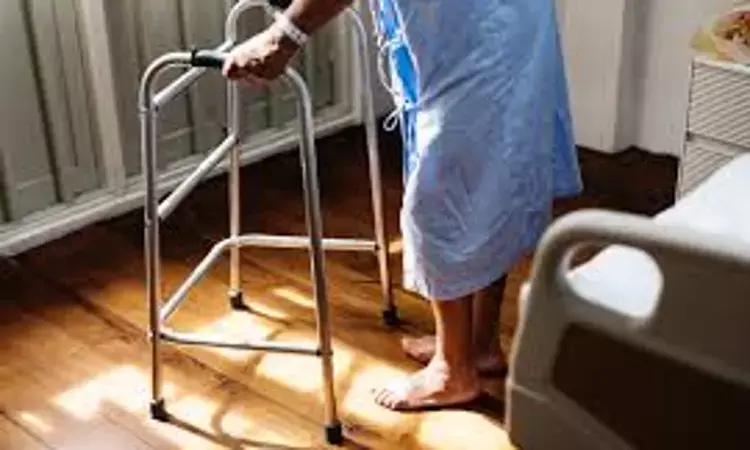- Home
- Medical news & Guidelines
- Anesthesiology
- Cardiology and CTVS
- Critical Care
- Dentistry
- Dermatology
- Diabetes and Endocrinology
- ENT
- Gastroenterology
- Medicine
- Nephrology
- Neurology
- Obstretics-Gynaecology
- Oncology
- Ophthalmology
- Orthopaedics
- Pediatrics-Neonatology
- Psychiatry
- Pulmonology
- Radiology
- Surgery
- Urology
- Laboratory Medicine
- Diet
- Nursing
- Paramedical
- Physiotherapy
- Health news
- Fact Check
- Bone Health Fact Check
- Brain Health Fact Check
- Cancer Related Fact Check
- Child Care Fact Check
- Dental and oral health fact check
- Diabetes and metabolic health fact check
- Diet and Nutrition Fact Check
- Eye and ENT Care Fact Check
- Fitness fact check
- Gut health fact check
- Heart health fact check
- Kidney health fact check
- Medical education fact check
- Men's health fact check
- Respiratory fact check
- Skin and hair care fact check
- Vaccine and Immunization fact check
- Women's health fact check
- AYUSH
- State News
- Andaman and Nicobar Islands
- Andhra Pradesh
- Arunachal Pradesh
- Assam
- Bihar
- Chandigarh
- Chattisgarh
- Dadra and Nagar Haveli
- Daman and Diu
- Delhi
- Goa
- Gujarat
- Haryana
- Himachal Pradesh
- Jammu & Kashmir
- Jharkhand
- Karnataka
- Kerala
- Ladakh
- Lakshadweep
- Madhya Pradesh
- Maharashtra
- Manipur
- Meghalaya
- Mizoram
- Nagaland
- Odisha
- Puducherry
- Punjab
- Rajasthan
- Sikkim
- Tamil Nadu
- Telangana
- Tripura
- Uttar Pradesh
- Uttrakhand
- West Bengal
- Medical Education
- Industry
Frailty may accurately predict outcomes in patients undergoing vestibular schwannoma resection

The most frequent question asked is about the independent prognostic associations of chronological age and frailty (physiological age) with outcomes following vestibular schwannoma (VS) resection.
To answer this, Alis J. Dicpinigaitis and colleagues from the School of Medicine, New York Medical College, Valhalla, New York found out that frailty may be more accurate for predicting outcomes and guiding treatment decisions than advanced patient age alone following VS resection.
The research is published in the JAMA Otolaryngology- Head and Neck Surgery Journal.
Although numerous studies have evaluated the influence of advanced age on surgical outcomes following vestibular schwannoma (VS) resection, few if any large-scale investigations have assessed the comparative prognostic effects of age and frailty. As the population continues to age, it is imperative to further evaluate treatment and management strategies for older patients.
Therefore, the present study was conducted with the sole objective to conduct a population-based evaluation of the independent associations of chronological age and frailty (physiological age) with outcomes following VS resection.
In this large-scale, multicenter, cross-sectional analysis, weighted discharge data from the National Inpatient Sample were searched to identify adult patients (≥18 years old) who underwent VS resection using International Classification of Diseases, Ninth Revision, Clinical Modification and Tenth Revision, Clinical Modification codes. Data collection and analysis took place.
Complex samples regression models and receiver operating characteristic curve analysis were used to evaluate the independent associations of frailty and age (along with demographic confounders) with complications and discharge disposition. Frailty was evaluated using the previously validated 11-point modified frailty index (mFI).
The following findings were seen-
a. Among the 27 313 patients identified for VS resection, the mean (SEM) age was 50.4 (0.2) years, 15 031 (55.0%) were women, and 4720 (21.0%) were of non-White race/ethnicity, as determined by the National Inpatient Sample data source.
b. Of the included patients, 15 090 (55.2%) were considered robust (mFI score = 0), 8204 (30.0%) were prefrail (mFI score = 1), 3022 (11.1%) were frail (mFI score = 2), and 996 (3.6%) were severely frail (mFI score ≥3).
c. On univariable analysis, increasing frailty was associated with development of postoperative hemorrhagic or ischemic stroke (odds ratio [OR], 2.44 [95% CI, 2.07-2.87]; area under the curve, 0.73), while increasing age was not.
d. Following multivariable analysis, increasing frailty and non-White race/ethnicity were independently associated with both mortality (adjusted OR [aOR], 2.32 [95% CI, 1.70-3.17], and aOR, 3.05 [95% CI, 1.02-9.12], respectively) and extended hospital stays (aOR, 1.54 [95% CI, 1.41-1.67], and aOR, 1.71 [95% CI, 1.42-2.05], respectively), while increasing age was not.
e. Increasing frailty (aOR, 0.61 [95% CI, 0.56-0.67]), age (aOR, 0.98 [95% CI, 0.97-0.99]), and non-White race/ethnicity (aOR, 0.62 [95% CI 0.51-0.75]) were all independently associated with routine discharge.
Hence, the authors concluded that "frailty may be more accurate for predicting outcomes and guiding treatment decisions than advanced patient age alone following vestibular schwannoma (VS) resection."
Dr. Nandita Mohan is a practicing pediatric dentist with more than 5 years of clinical work experience. Along with this, she is equally interested in keeping herself up to date about the latest developments in the field of medicine and dentistry which is the driving force for her to be in association with Medical Dialogues. She also has her name attached with many publications; both national and international. She has pursued her BDS from Rajiv Gandhi University of Health Sciences, Bangalore and later went to enter her dream specialty (MDS) in the Department of Pedodontics and Preventive Dentistry from Pt. B.D. Sharma University of Health Sciences. Through all the years of experience, her core interest in learning something new has never stopped. She can be contacted at editorial@medicaldialogues.in. Contact no. 011-43720751
Dr Kamal Kant Kohli-MBBS, DTCD- a chest specialist with more than 30 years of practice and a flair for writing clinical articles, Dr Kamal Kant Kohli joined Medical Dialogues as a Chief Editor of Medical News. Besides writing articles, as an editor, he proofreads and verifies all the medical content published on Medical Dialogues including those coming from journals, studies,medical conferences,guidelines etc. Email: drkohli@medicaldialogues.in. Contact no. 011-43720751


